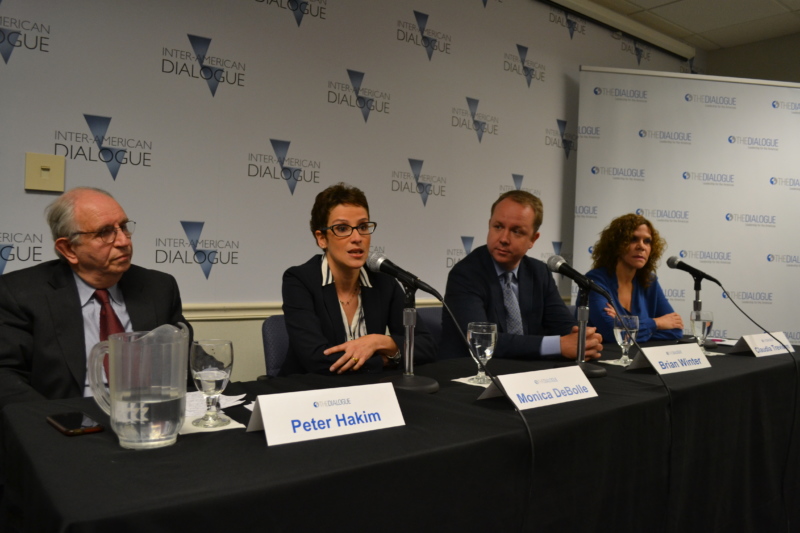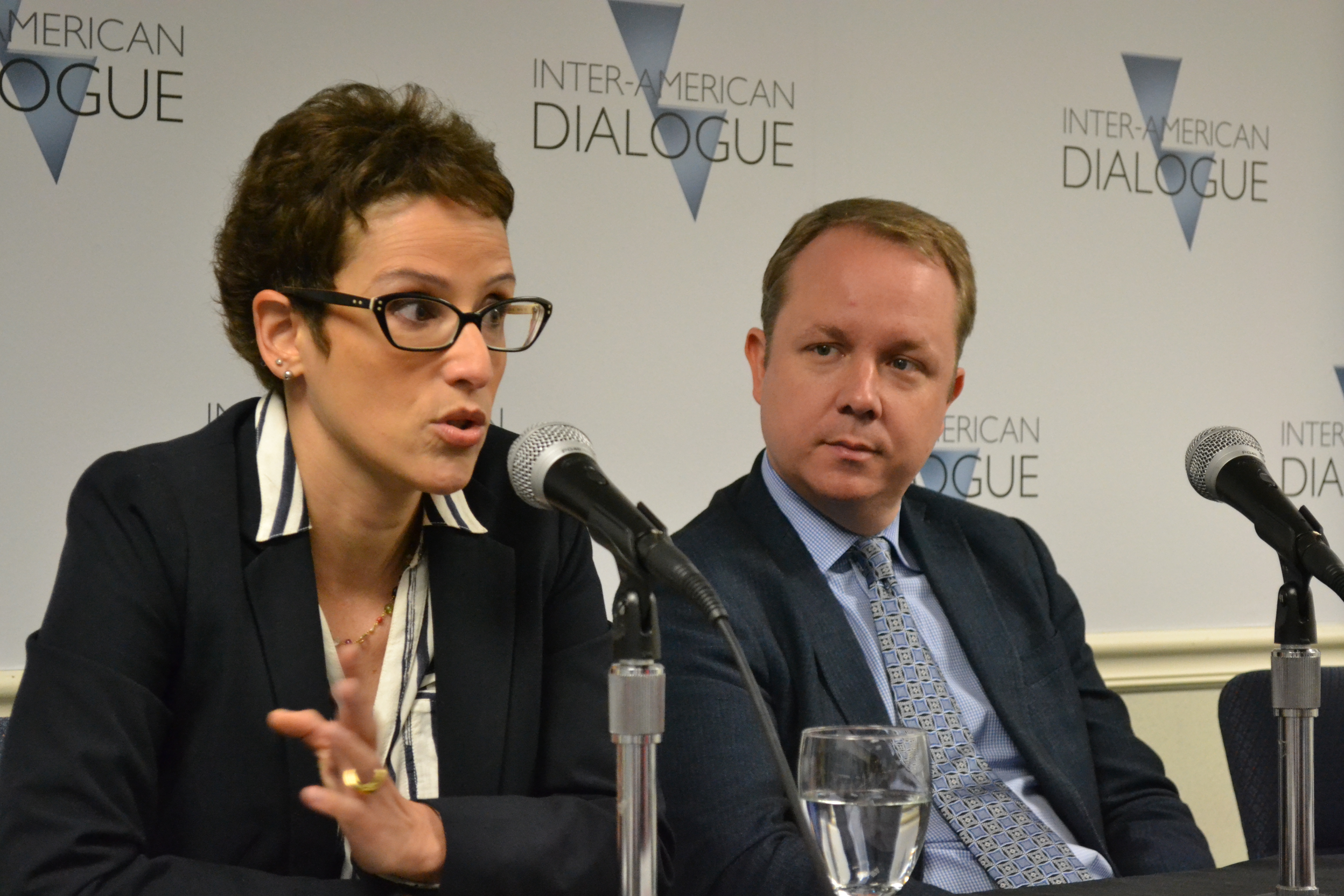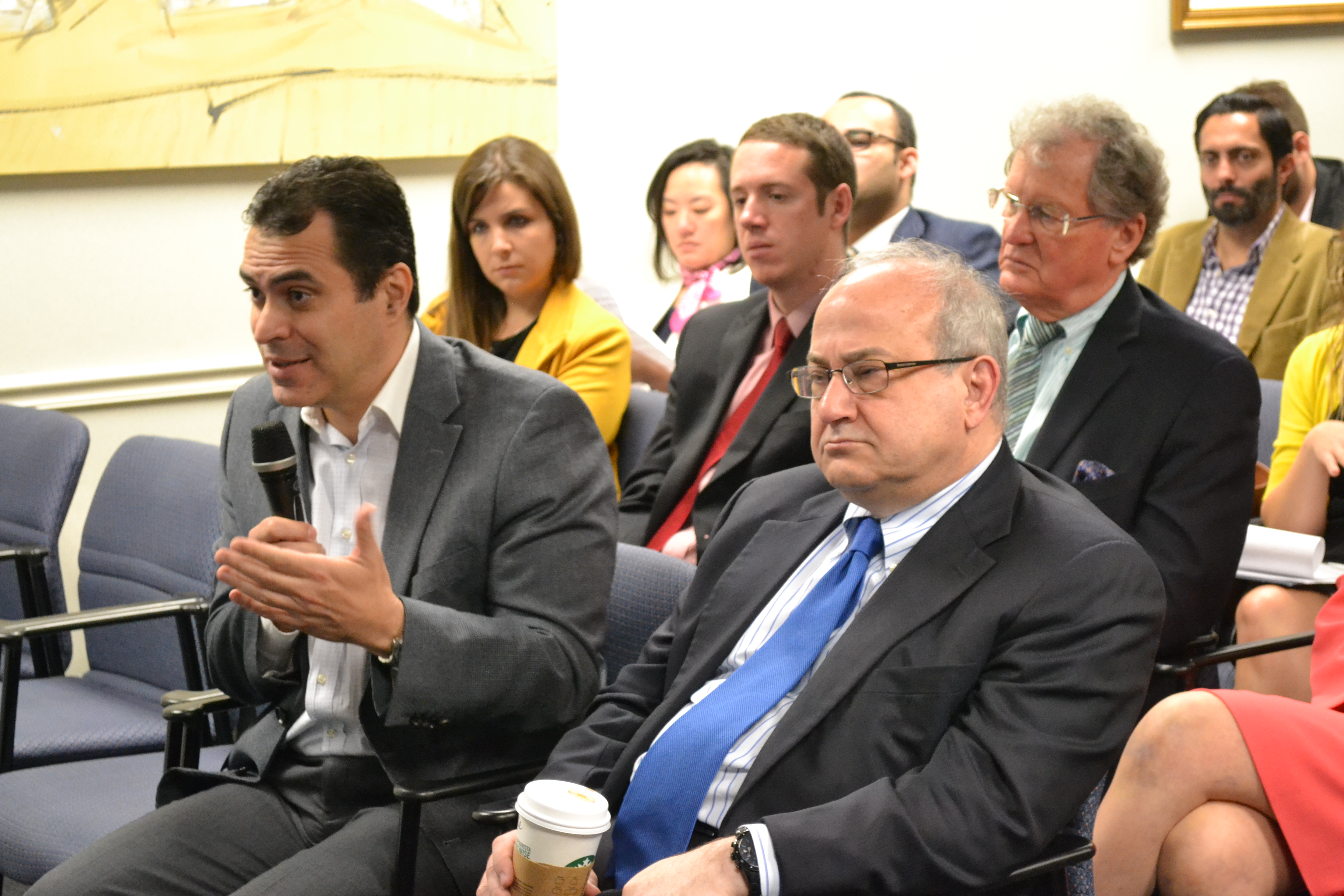Dilma Out, Temer In, What Next?
 Ben Raderstorf / Inter-American Dialogue
Ben Raderstorf / Inter-American Dialogue
On May 20th, 2016, the Inter-American Dialogue hosted an event—“Dilma Out, Temer In, What Next?”—to discuss possible scenarios in Brazil following the suspension of President Rousseff. The panel consisted of Monica de Bolle, Non-resident Senior Fellow at the Peterson Institute of International Economics, Claudia Trevisan, US Correspondent for O Estado de S. Paulo and Brian Winter, Vice President for Policy at the Americas Society/Council of the Americas and Editor-in-Chief of Americas Quarterly. Peter Hakim, Senior Fellow and President Emeritus of the Inter-American Dialogue, moderated the event.
While introducing the panel, Hakim pointed to the controversy caused by the impeachment process in Brazil, specifically the decision to depose President Rousseff: “Some think it’s the solution, a way to start anew, others see it as an illegal coup d’état.” He explained that rather than studying the past, the event would concentrate on looking forward. Hakim then posed specific questions to the panelists.
Can Dilma come back as President?
To Trevisan, this outcome seemed unlikely. She insisted that unless the Lava Jato investigations affect Temer greatly, Rousseff would probably be impeached. Winter agreed with Trevisan yet highlighted how recent events in Brazil indicate that “anything is possible.” To Winter, the suspended president came full circle in terms of popularity, she was one of the most popular heads of state in 2012 yet she left office while being one of the most unpopular. Moreover, he argued that her popularity ratings tend to reflect the public satisfaction or discontent with the status of the economy more than her actual popularity; “even when her popularity was high, she was not beloved.”
When you add interests on the debt, fiscal deficit is as high as 12% of GDP #Next4Brazil pic.twitter.com/gcX9LDta67
— The Dialogue (@The_Dialogue) May 20, 2016
De Bolle agreed with the other panelists. She pointed out the growing 11% rate of unemployment and deficit, which—excluding interest payments on the debt—amounts to 4.5% of GDP (or 12% to 13% of GDP including interest). Seeking to “unpack” the figure, de Bolle explained that it is a reflection of measures taken by Rousseff before leaving office, such as delayed payments to suppliers and cash injections to Petrobras and Eletrobras. She described 2016 as “the year of recognition of much of a fiscal hole Brazil has compared to 2015.” Given that this economic destruction is associated with Rousseff, de Bolle argued, the suspended president will almost certainly not return to power.
Can Temer hold on to the job given that he is also facing charges? What would happen if he does not?
Finding the question too hypothetical, Trevisan focused on the composition of Temer’s cabinet. She described his government as a “Dr. Jekyll and Mr. Hyde,” with his economic team as the “dream of orthodox economists” on one side and Brazil’s political system—which spurred the Lava Jato investigations—at the other side. She argued that his cabinet is an attempt to capitalize on Congressional support. Its main risk, Trevisan argued, is judicial, given the corruption investigations in which they might possibly be implicated.
Can Temer resolve the economic problems?
De Bolle did not express too much hope for Temer’s economic team, but she emphasized that while they may not be able to resolve fiscal problems in the short run they do have an advantage. She argued that the Temer administration could “live with the deficit in 2016 and 2017 as long as they signal that this [fiscal crisis] will change in the medium term.” De Bolle insisted that the best way to address the crisis in the medium term would be by including a debt limit on Brazil’s fiscal responsibility law and to make Brazil’s budget more flexible. Cutting spending and raising taxes right away is not the solution, according to de Bolle, who believes this government will be more able to pass the necessary measures than Rousseff’s was.
Temer is also very unpopular. What are his chances of success in lasting beyond this period?
Before impeachment, 62 percent of voters wanted Rousseff out, but 58 percent also wanted Temer gone. #Next4Brazil pic.twitter.com/v78XvyDmcC
— The Dialogue (@The_Dialogue) May 20, 2016
Winter expressed concern about the cabinet’s composition, arguing that Temer’s cabinet may not understand how much Brazil has changed. “Closing the fiscal gap is going to be unpopular,” added Winter, highlighting the challenges of a government that came to power in a “disputed way” in garnering the trust of citizens while making undesired changes. Trevisan wondered whether the economy might be able to save the interim administration. De Bolle alluded to the cabinet’s “retro image,” stating “Brazil is not going to need the IMF because the men in dark suits are already there.” Yet de Bolle insisted that any slight positive change will have a huge impact. She also argued that there is a good possibility that the economy will start to stabilize soon.
Is there a conflict between prosecuting corruption and getting the government to work well and the economy right?
.@claudianoseua discusses why the #lavajato investigation will not and should not slow down. #Next4Brazil pic.twitter.com/DzFtNrNqlL
— The Dialogue (@The_Dialogue) May 20, 2016
“There doesn’t have to be,” replied Winter, pointing to the tremendous changes Brazil has seen so far in terms of technology, growth of the middle class, and strengthening of judicial institutions. “I don’t think the PT is more corrupt than other parties, we just didn’t know the extent of its actions,” added Winter. Trevisan emphasized that while there is an “obvious conflict,” given that some in the new government have been accused of corruption, there is no turning back on the investigations; Temer’s support would weaken tremendously if he attempts to interfere with Lava Jato.
Once the conversation was opened to the public, questions were raised about the possible effects on Brazil of Venezuela’s collapse, the legitimacy of the impeachment process, inflation, and whether the public should be optimistic about Temer. “It is premature to be pessimistic,” argued De Bolle, “whenever things get really bad, Brazil finds a way out.” She added that inflation has already been coming down but that it will remain above the target ceiling. She defended the constitutionality of the impeachment process, as did the other panelists, and insisted that Rousseff violated multiple important pieces of fiscal responsibility legislation. In regards to Venezuela, de Bolle added that while the country is close to default, this government will not give Venezuela more money than Rousseff, saying that help may come in the form of humanitarian aid but little more. While he also defended the legality of the impeachment process, Winter warned that ignoring the controversy caused by the impeachment process will be perilous for the interim government.





















